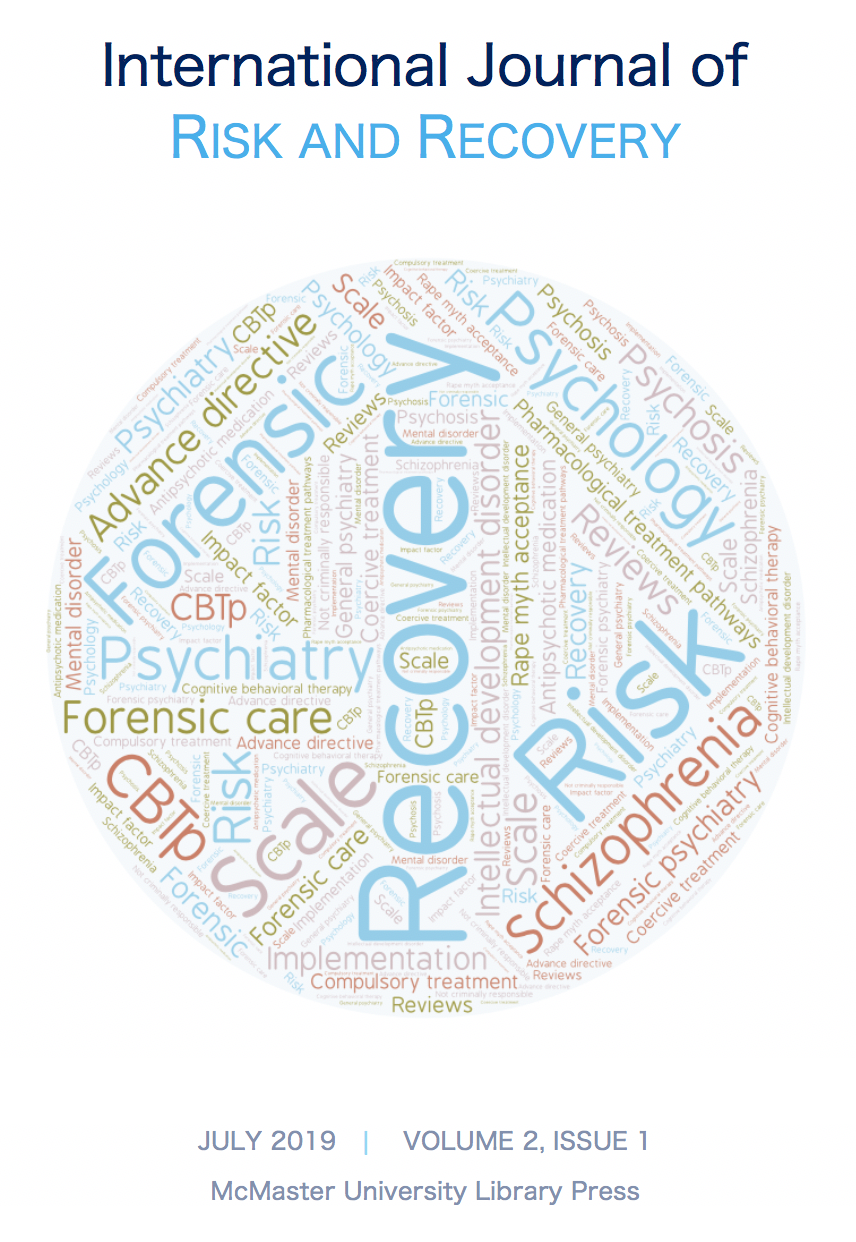Is the anticipated consent to treatment in advance directives a solution to coercive treatment in forensic psychiatry?
DOI:
https://doi.org/10.15173/ijrr.v2i1.3680Keywords:
Patient's advance directive, Antipsychotic medication, Coercive treatment, Forensic psychiatry, General psychiatry, GermanyAbstract
As a result of a Federal Constitutional Court decision on coercive treatment, in its state Law the federal state of Hesse has newly regulated the possibility of coercive treatment (Section 7 Paragraph 2 of the Hesse Law on the Enforcement of Court-ordered Hospital Treatment) and expressly incorporated the observance of a patient’s advance directive as defined by Sections 1901a and 1901b of the German Civil Code (Bürgerliches Gesetzbuch [BGB]). Having been sentenced to hospital order treatment under section 63 of the German Criminal Code (Strafgesetzbuch [StGB]), in the Vitos Haina Forensic Psychiatric Hospital thirteen patients with schizophrenia stated in a patient’s advance directive that they wished to be treated with certain antipsychotic medication in case of a recurring psychotic episode. In particular, the patient’s advance directive stated that this treatment should be compulsory if necessary. Based on a case vignette this article delineates both the motivation of the patients for such a patient’s advance directive as well as the legal limitations and the enforceability of such a patient’s advance directive. There is no prevailing view in the jurisdiction or literature on the utilization of a patient’s advance directive to guarantee an explicitly desired treatment in case of incapacity for consent. This article wishes to highlight the perspectives of those directly affected and to encourage discussion. Being of special interest for forensic psychiatry, these considerations may also be of importance for treatment considerations in general psychiatry.
References
Bundesverfassungsgericht. 2 BvR 882/09. 23 March 2011. (accessed on Jul 2, 2019) [Bun-desverfassungsgericht - Federal Constitutional Court]
Bundesverfassungsgericht. 2 BvR 633/11. 12 October, 2011. (accessed on Jul 2, 2019)
Bundesverfassungsgericht. 2 BvR 228/12. 20 February, 2013. (accessed on Jul 2, 2019)
Maßregelvollzugsgesetz (MvollG) Rheinland-Pfalz. Section 6 - Ausstattungsstandards und Unterbringungsformen, subsection 2, number 3. 1 Jan 2016. (accessed on Jul 2, 2019) [Law on the enforcement of court-ordered hospital treatment in a psychiatric hospital and in a drug rehabilitation facility of the state of Rhineland Palatinate]
Psychisch-Kranken-Hilfe-Gesetz (PsychKHG) of Baden-Württemberg. Section 20 - Behand-lung, subsection 5. 1 Jan 2019. (accessed on Jul 2, 2019) [Law on assistance and protec-tive measures in cases of mental illness]
Drittes Gesetz zur Änderung des Betreuungs-rechts (3. BtÄndG). Bundesgesetzblatt. 29 July 2009, Artikel I, p. 2286. (accessed on Jul 2, 2019) [Third Act amending the custodianship Act]
Steenbreker T. Zivilrechtliche Unbeachtlich-keit eines “natürlichen Willens” für den Widerruf der Patientenverfügung. Neue Jurist Wochenschr 2012;65:3207–11.
Bundesverfassungsgericht. 2 BvR 1866/17. 7 September 2017. (accessed on Jul 2, 2019) [Rejection of a temporary injunction]
Jakovljevic AK, Hesse D, Wiesemann C. Patientenverfügung und Behandlungsverein-barung als Instrumente der Vorausplanung in der forensischen Psychiatrie. Ethik Med 2016;28:223–38.
Brosey D. Psychiatrische Patientenverfügung nach dem 3. Betreuungsrechtsänder-ungsgesetz. Betreuungsrechtl Prax 2010;4:161–7.
Henking T, Vollmann J. Zwangsbehandlung psychisch kranker Menschen: Ein Leitfaden für die Praxis. Heidelberg: Springer, 2015.
Hessischen Maßregelvollzugsgesetzes (HMRVG). Section 7a, subsection 2. 15 April 2015. (accessed on Jul 2, 2019) [Law on the enforcement of court-ordered hospital treat-ment in a psychiatric hospital and in a drug rehabilitation facility of the state of Hesse].
Henking T. Patientenrechte in der Psychiatrie im Kontext von Zwang. Recht Psychiatr 2016;34:155–63.
Jürgens A. Betreuungsrecht - Commentary § 1901 1 marginal note 11. 4th Ed. Munich: Beck; 2010.
Götz T. Die rechtlichen Grenzen der Patien-tenautonomie bei psychischen Erkrankungen. 1st Ed. Baden-Baden: Nomos; 2013.
Hoffmann B. Patientenwille, Patienten-verfügung, Behandlungswunsch ein Jahr nach Inkrafttreten des 3. BtÄndG. Recht Psychiatr 2010;28:201–210.
Heitmann E. §1901 a marginal note 46. In: Kaiser D., Schnitzler K., Friederici P. (Eds) Nomos Kommentar - Bürgerliches Ge-setzbuch. 2nd Ed. Baden-Baden: Nomos, 2010. [commentary]
Bohnert C. Zwangsbehandlung auf rechtsgeschäftlicher Grundlage. Recht Psy-chiatr 2013; 31:18–22.
Fischer T. Strafgesetzbuch (StGB) vor § 32, marginal note 3b ff. 64th Ed. Munich: Beck, 2017. [commentary]
Downloads
Published
How to Cite
Issue
Section
License
Copyright Notice
Authors who publish with this journal agree to the following terms:
- Authors retain copyright of their work and grant the International Journal of Risk and Recovery the right of first publication with the work simultaneously licensed under a Creative Commons Attribution License. This allows others to share the work with an acknowledgement of the work’s authorship and initial publication in this journal.
- Authors are able to enter into separate, additional contractual arrangements for the non-exclusive distribution of the journal’s published version of the work (e.g., post it to an institutional repository or publish it in a book) with an acknowledgement of its initial publication in this journal.
- Authors are permitted and encouraged to post their work online (e.g., in institutional repositories or on their websites) before and during the submission process as it can lead to productive exchanges, as well as earlier and greater citation of published work. (See The Effect of Open Access.)

